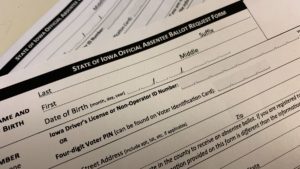Unlike school, the election or reelection of the president cannot be delayed, because its timetable is written into the Constitution. It’s too late now to change the procedures by which our ballots will be cast and counted, and “return to sender” should apply to the proposal to elect our president by mail.
Electing the president involves tens of thousands of officials in 50 states and over 4,000 counties, not to mention the massive volunteer army of citizens who staff over 100,000 polling places. Adherence to proper procedure is a vital safeguard as we select a single person to exercise what the Constitution calls “the executive power” of the United States.
With so much riding on the outcome, we must resist the pressure by Democrats to use COVID-19 as a pretext to change the process at the last minute. Despite the pandemic, sports leagues have not changed the rules by which hits, runs, errors, touchdowns, extra points, goals, and other game-winning events are measured and tabulated.
Even Democrat-leaning columnists are beginning to recognize that it is just not feasible for the widespread use of mail-in ballots in this election, as some have called for. Partly it is a question of scale: our election system was not built for 100 million ballots to be sent out to eligible voters and then mailed back and tabulated in the short time available.
Nor is there any way for millions of mail-in ballots to be counted fairly and accurately enough for Americans to accept the candidate who declares victory in such an untested process. No system ever works perfectly the first time it is used, but the winner will be entitled to the keys to the White House, the nuclear “football,” and the appointment of judges for the next four years.

Over 200 lawsuits have already been filed, mostly by Democrats, in a well-funded effort to change various aspects of the process by which the upcoming election will be conducted. Here are a few examples, but there are many more in the pipeline that could affect the outcome.
In Texas, the Democrat county clerk of massive Harris County (Houston) announced plans to mail absentee ballot applications to all 2.2 million registered voters. The Republican state attorney general filed suit to stop that plan because state law limits absentee ballots to persons with health disabilities or other good reasons for not casting a ballot in person at a polling place.
In Iowa, two Democrat county clerks were sending ballot applications in which critical voter information was “prepopulated.” In other words, the registered voter’s personal information (including voter ID number) was already filled in, ostensibly for the voter’s convenience.
Judges in the two counties, Linn (population 200,000) and Woodbury (population 100,000), issued separate rulings last week putting a stop to that practice, which could have allowed someone other than the voter to submit a prepopulated ballot application. Both judges ordered their county clerks to issue new absentee ballot applications with blanks to be fully completed by the voter as state law requires.
In both counties, the clerks had repeated the Democrats’ mantra that precautions are unnecessary because voter fraud is virtually non-existent, but as Judge Patrick Tott of Woodbury County pointed out, “it is also the type of fraud that is almost impossible to detect.”
“From a practical perspective,” Judge Tott continued, “once fraud has occurred it will already likely be too late. Sending out absentee ballot requests with all the information that a person that intends to commit fraud would need certainly does not limit the likelihood of fraud taking place, but would likely help to facilitate it.”
Linn County Judge Ian Thornhill separately observed: “It is implausible to conclude that near total completion of an absentee ballot application by the auditor is authorized under Iowa law where the legislature has specifically forbidden government officials from partially completing the same document.”
As the two Iowa decisions illustrate, legitimate absentee ballots require a high degree of time and attention by both the voter and the county clerk (or auditor, as the county official is called in Iowa). Most counties are unprepared to cope with a surge in absentee ballots, and most voters are likewise unprepared to cope with the amount of paperwork required to vote absentee.
Mail-in voting is too complicated for too many voters. There are too many ways in which a careless voter can spoil his ballot, causing it to be rejected by election officials, with no time to fix or cure the mistake.
Many voters would run out of time to complete the process of requesting and casting an absentee or mail-in ballot. According to a recent survey by the New York Times, 35 states do not allow enough time to request, receive, and return a mail-in ballot.
John and Andy Schlafly are sons of Phyllis Schlafly (1924-2016) and lead the continuing Phyllis Schlafly Eagles organizations with writing and policy work.






